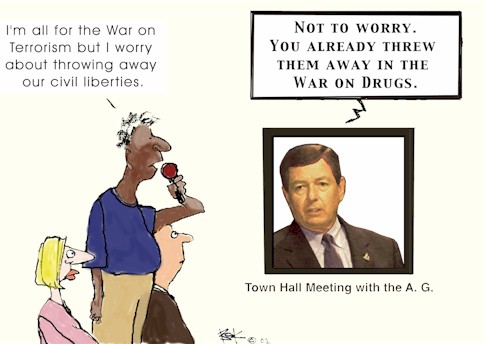"What happens when law-enforcement agencies rewrite their agendas to target assets rather than crime? Contemporary police, prosecution and court records furnish the answer. As expected, they disclose massive numbers of seizures, a large majority of which are unaccompanied by criminal prosecution."
The Nation, 3-9-98, (Thanks to SP)

U.S. GAO report (GAO/GGD-98-111) 5/98:
"In addition to protecting criminals or ignoring their activities, officers involved in drug-related corruption were more likely to be actively involved in the commission of a variety of crimes, including stealing drugs and/or money from drug dealers, selling drugs, and lying under oath about illegal searches." ***
"The most commonly identified pattern of drug-related police corruption involved small groups of officers who protected and assisted each other in criminal activities, rather than the traditional patterns of non-drug-related police corruption that involved just a few isolated individuals or systemic corruption pervading an entire police department or precinct." ***
"One commonly identified factor associated with drug-related corruption was a police culture that was characterized by a code of silence, unquestioned loyalty to other officers, and cynicism about the criminal justice system. Such characteristics were found not only to promote police corruption, but to impede efforts to control and detect it." ***
"Police corruption, according to the academic and other literature and anticorruption commission reports we reviewed, is not a new problem and dates back to the establishment of the first organized local police forces. According to a report by the Knapp Commission when the NYPD was established in 1844 as the first municipal police department in this country, it experienced immediate problems with extortion and other corrupt activities." ***
"As in New York City, corruption has plagued police departments in many major cities at some point in their history, including Boston, Chicago, Detroit, Los Angeles, Miami, New Orleans, and Philadelphia."
"While it has been a persistent problem for law enforcement, the nature of police corruption has varied over time. Historically, police corruption involved such low-level and passive activities as bribery schemes and nonenforcement of the law. Also, early police corruption was often depicted as the result of a few dishonest individuals--commonly referred to as "rotten apples"--in an otherwise honest department. However, during the police corruption scandals of the 1970s and 1980s, the corruption uncovered in several cities was found to be systemic, rather than attributable to individual behavior." ***
"The relationship between police culture and police corruption,
including drug-related police corruption, was a recurring theme articulated by our various sources. They generally concurred that although police culture may be positive (i.e., supportive of
integrity), a negative culture (i.e., one that supported or generally ignored corruption) was a key factor associated with drug-related police corruption. Among the attitudes and values identified as
characteristics of a police culture that supported corruption were the following: (1) a code of silence with grave consequences for those violating it; (2) loyalty to other officers above all else; (3) police cynicism or disillusionment about their jobs, the criminal justice system, and public support for those who performed properly; and (4) indoctrination on the job as to what is acceptable behavior--for example, ignoring corruption."